Contents
Market Overview
Macro Review
A turbulent week for markets in the thick shadow of global central banks’ policy tightening. In the U.S., the Federal Reserve went against its recent forward guidance and delivered its first 75bps increase since 1994. Chair Powell explained in his press briefing that the jump in longer-term inflation expectations reported by the latest University of Michigan survey on Friday of last week tilted the balance at the FOMC in favor of more aggressive tightening. Powell also pledged to implement and maintain sufficiently “restrictive” monetary policy to bring inflation down to its 2% medium-term target but acknowledged that the supply-side factors that dominate the U.S. and global inflation outlooks are “outside of the Fed’s control”. The prospect of further 75bps hikes at upcoming meetings roiled markets amid quick repricing of the Fed’s pace and terminal interest rate in the current cycle and corresponding increasing recession fears. The Fed’s updated dot plot of individual economic projections sees the year-end policy rate at 3.4%, versus 1.9% in March, and at 3.8% in 2023 (vs 2.8% previous), but prominent Fed-watchers have expressed concerns that those projections might need to be revised again soon. While the Fed’s largest move in almost 30 years was expected by markets in the wake of the latest U.S. inflation data dynamics, the Swiss National Bank (SNB) delivered a real shock by hiking its policy rate by 50bps to -0.25%. SNB’s first rate increase since 2007 carries major global market implications as it represents a structural policy shift by arguably the most dovish major central bank away from its long-standing battle to prevent Swiss Franc (CHF) appreciation toward focusing on combating inflation by hiking rates and accepting the risk of a stronger currency. The CHF surged to multi-decade highs against other major currencies in the aftermath of SNB’s decision. Amid increasingly hawkish bias by global central banks this week, investors are recalibrating expectations about terminal rates and the economic impact of tighter monetary policy across EM and DM. The critical question for markets at this stage is “When will peak hawkishness occur?”. The answer hinges mostly on developments in Ukraine and China with geopolitical overtone, which makes it unusually complicated to handicap for both policy makers and investors.
EM Credit Update
Amid global central banks’ policy tightening and liquidity withdrawal, emerging market sovereign credit ended the week down 2.5% with spreads 35bps wider. Corporate credit was down 1.6% with spreads 25bps wider. Sovereign outperformers this week were Ghana, Lithuania, and Turkey, while Tunisia, Sri Lanka and El Salvador underperformed.
The Week Ahead
Key events in EM next week include Inflation releases in Brazil, Mexico, South Africa and Malaysia, and interest rate decisions in Mexico, Czech Republic, Egypt, Turkey and Indonesia. Except in the case of Turkey where interest rate increases are politically constrained, we expect the policy tightening cycle by orthodox EM central banks to continue, with risks for rate hikes tilted to the upside amid DM hawkishness. The second round of Colombia’s presidential elections is on Sunday, putting left-wing Senator Gustavo Petro against populist businessman Rodolfo Hernández whose political ideology and policy priorities remain shrouded in significant uncertainty. Markets will be looking for clues on economic team and policy commitments by the winning candidate amid strong voter discontent with the political establishment and demands for economic and social change.
Highlights from emerging markets discussed below include: Colombia heads to historic presidential runoff between two candidates competing to capitalize on strong voter demand for “change”; Ghana announces $1bn in external financing; and Pakistan budget moves government closer to pending IMF disbursement.
Fixed Income
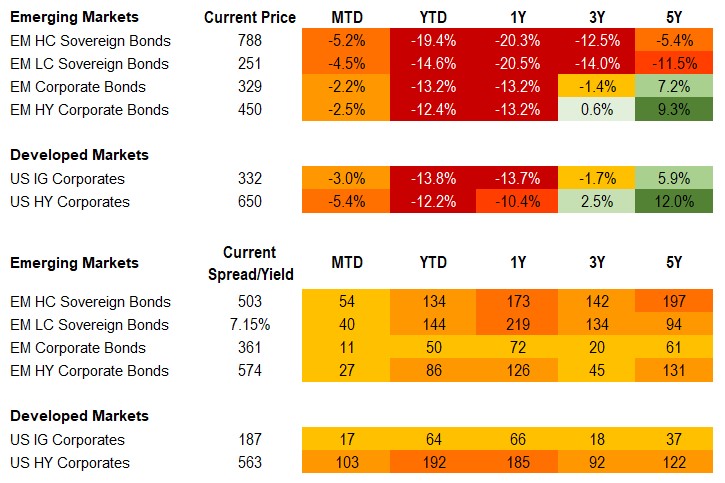
Equities
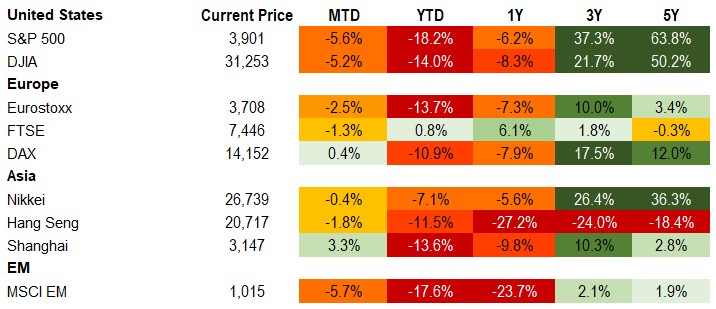
Commodities

Source for data tables: Bloomberg, JPMorgan, Gramercy. EM Fixed Income is represented by the following JPMorgan Indicies: EMBI Global, GBI-EM Global Diversified, CEMBI Broad Diversified and CEMBI Broad High Yield. DM Fixed Income is represented by the JPMorgan JULI Total Return Index and Domestic High Yield Index. Fixed Income, Equity and Commodity data is as of June 17, 2022 (mid-afternoon).
Emerging Markets Weekly Highlights
Colombia heads to historic presidential runoff between two candidates competing to capitalize on strong voter demand for “change”
Event: The second round of Colombia’s presidential election takes place on Sunday, June 19th. It pits left-wing Senator, Gustavo Petro (who got 40.3%/~8.5m votes in the first round) against populist businessman, Rodolfo Hernández (28.2%/~6m votes in the first round) whose political ideology and policy priorities remain shrouded in significant uncertainty.
Gramercy commentary: The last polls ahead of the vote have indicated a statistical tie between Petro and Hernandez, and accordingly, investors are bracing for a very tight election night with divergent outcomes in terms of economic policy outlook. The two candidates present clear, albeit very different, challenges to markets. Petro and Hernandez have both been vying to position themselves as “agents of change” amid salient voter discontent with the political and economic status quo, but from opposite ends of the political spectrum. Some of Senator Petro’s priorities include improving economic equality via higher taxes for the wealthy and boosting government spending on social and environmental priorities. Hernandez has been mostly ambivalent on his economic policy priorities, instead preferring to focus on an aggressive anti-corruption and anti-establishment message, which appeared to have propelled him to the runoff at the expense of the mainstream center-right candidate Fico Gutierrez. In this context of elevated policy uncertainty for markets, the credit outlook hinges on the resiliency of Colombia’s traditionally robust economic and political institutions and their ability to withstand potential pressure for radical change by the new president and his administration. A highly fragmented but generally centrist Congress points to a significant policy gridlock for the new government and should also provide a counterbalance against any structural deviations from Colombia’s orthodox macroeconomic framework. Last, but not least, the credibility of the incoming economic team the new president puts in charge of economic policy will play a critical role in shaping market sentiment, especially if Rodolfo Hernandez emerges as the winner. The appointment of a credible technocratic team by Hernandez is likely to be seen by investors as a powerful credit positive signal, and vice versa.
Ghana announces $1bn in external financing
Event: The government obtained a $750mm syndicated loan led by Standard Bank, Standard Chartered, and Rand Merchant Bank along with $250mm from multilateral lenders. At the same time, the Deputy Finance Minister was quoted saying that the government may turn to the IMF if their ‘homegrown’ program does not work. Separately, diesel and petrol prices are expected to rise by 11% and 13%, respectively this week posing upside risk to inflation.
Gramercy commentary: The financing is a constructive, and well telegraphed development in line with authorities’ previous guidance. This should help to cover external financing needs for the second half of the year but with additional funds likely needed depending on how the fiscal deficit, portfolio flows, and local market demand evolves between now and year end. The government reportedly has an additional $1bn it intends to raise privately. We see the slight departure from previously anti-IMF program statements as incrementally positive, but it does not mean much in the near-term until talks formally begin. If the government is unable to raise additional financing needed later this year, we believe there is an increased likelihood that formal IMF negotiations over a program will begin.
Pakistan budget moves government closer to pending IMF disbursement
Event: The Ministry of Finance presented its FY23 budget last week, which entails a growth rate of 5% y/y and deficit of 4.9% of GDP with just over 2% of GDP in consolidation relative to the prior year. Petroleum and power subsidies have been slashed significantly while taxes on real estate and banking sectors increased. The government aims to raise just under $2bn in Eurobonds or sukuks.
Gramercy commentary: We see the budget as nearly satisfactory for the IMF, perhaps with a few additional tweaks particularly on personal income tax. Thereafter, the budget should be sufficient for approval of the 7th EFF disbursement of $700mm in coming weeks or months. However, implementation will remain challenging with elevated political risk and chance for early elections as the year progresses, leaving open the possibility for another pause to the IMF program and keeping asset prices subject to volatility.
Emerging Markets Technicals
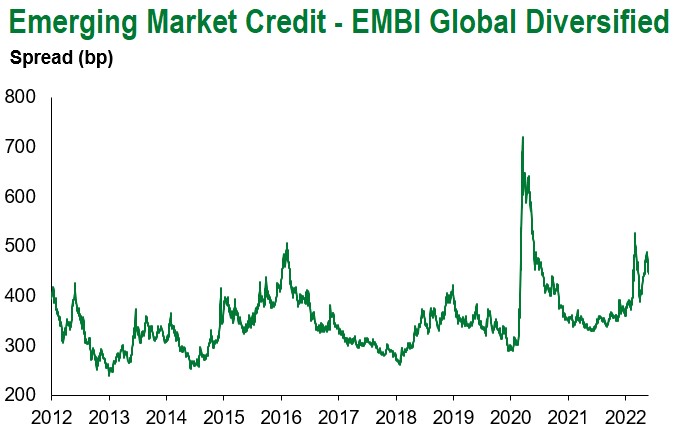
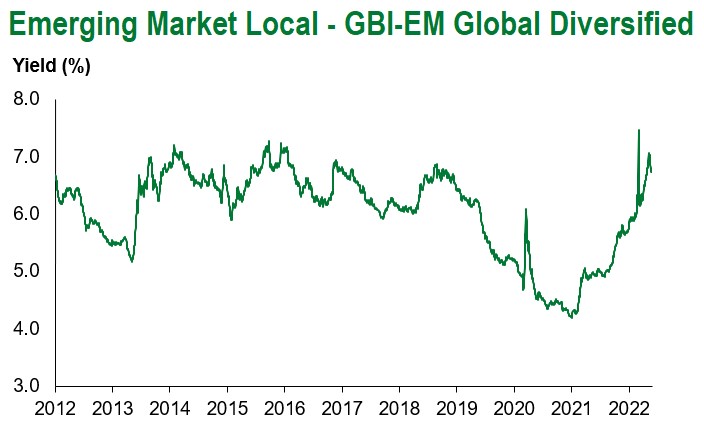
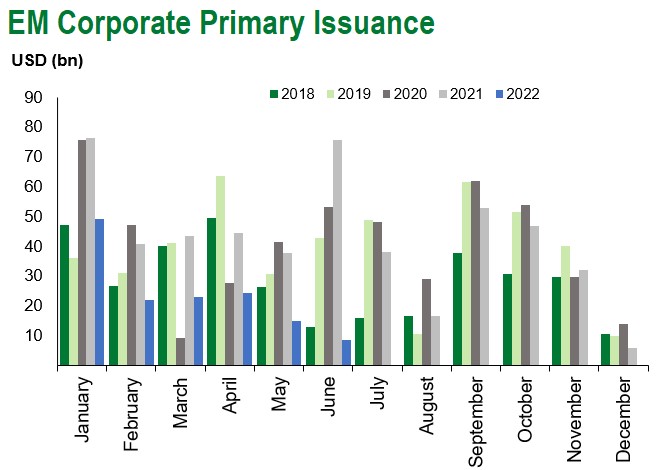
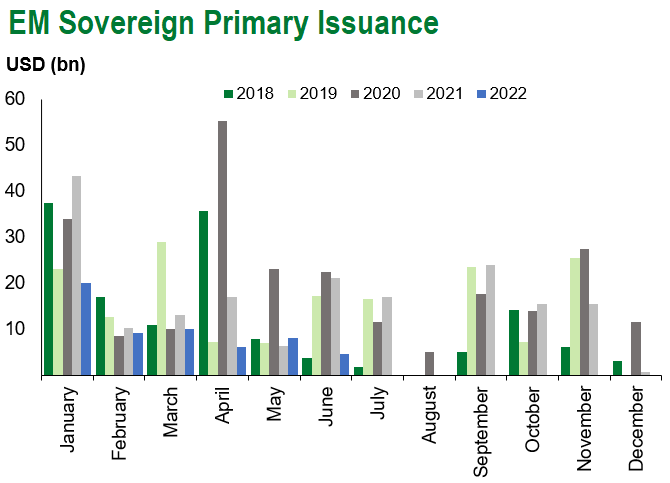
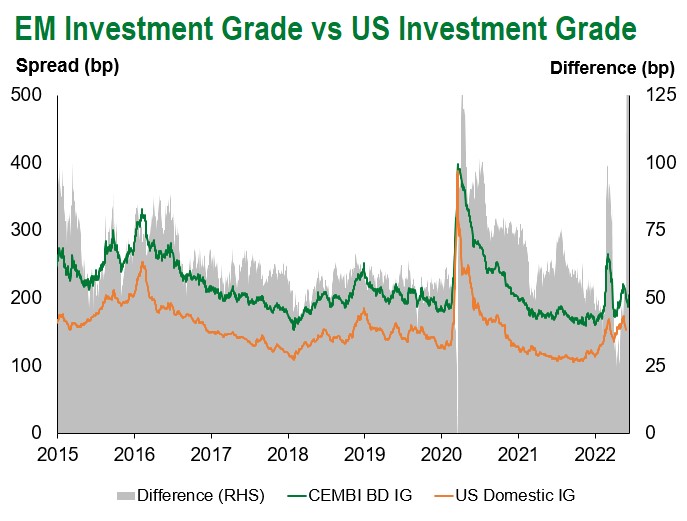
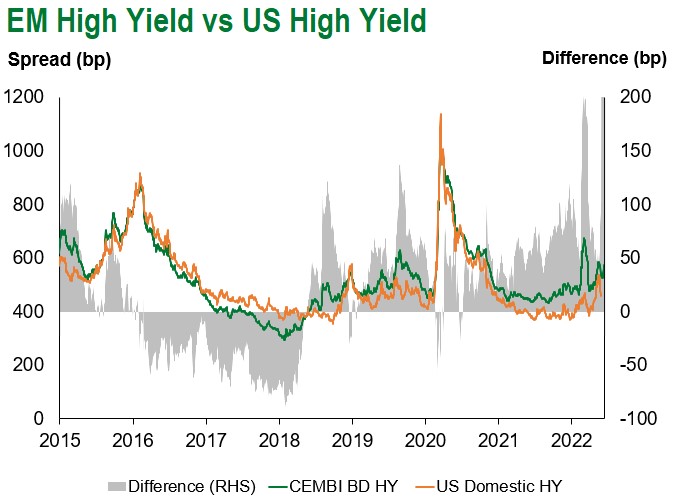
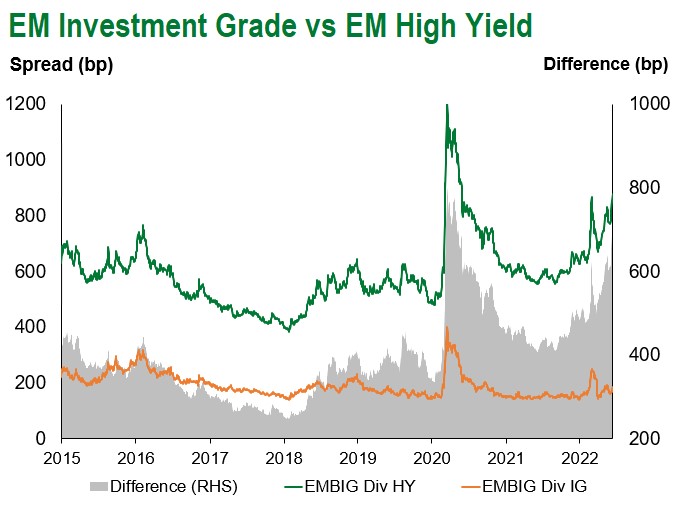
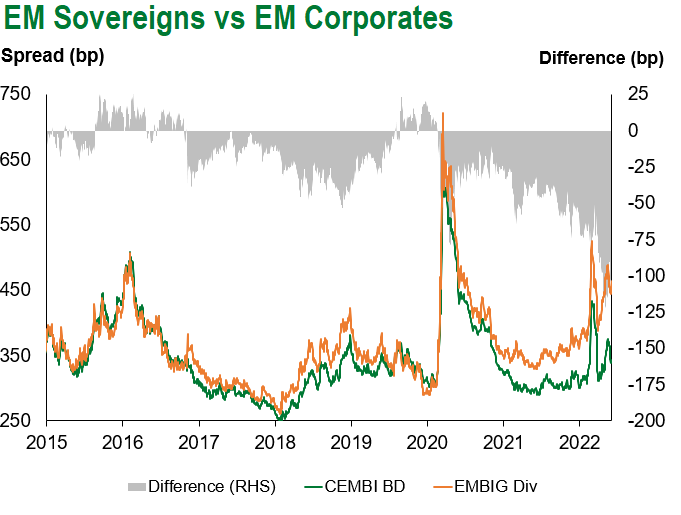
Emerging Markets Flows
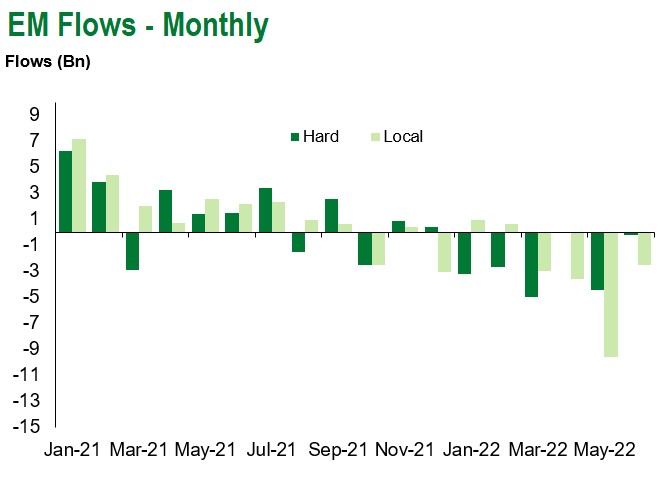
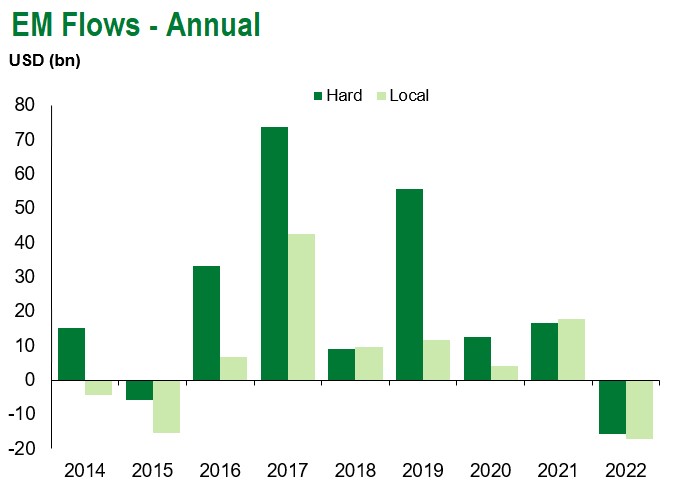
Source for graphs: Bloomberg, JPMorgan, Gramercy. As of June 17, 2022.
COVID Resources:
Johns Hopkins COVID-19 Case Tracker
For questions, please contact:
Kathryn Exum, CFA ESG, Director, Co-Head of Sovereign Research, [email protected]
Petar Atanasov, Director, Co-Head of Sovereign Research, [email protected]
James Barry, Director, Deputy Portfolio Manager, [email protected]
Tolu Alamutu, CFA, Director, Corporate Research Analyst, [email protected]
This document is for informational purposes only. The information presented is not intended to be relied upon as a forecast, research or investment advice, and is not a recommendation, offer or solicitation to buy or sell any securities or to adopt any investment strategy. Gramercy may have current investment positions in the securities or sovereigns mentioned above. The information and opinions contained in this paper are as of the date of initial publication, derived from proprietary and nonproprietary sources deemed by Gramercy to be reliable, are not necessarily all-inclusive and are not guaranteed as to accuracy. This paper may contain “forward-looking” information that is not purely historical in nature. Such information may include, among other things, projections and forecasts. There is no guarantee that any forecasts made will come to pass. Reliance upon information in this paper is at the sole discretion of the reader. You should not rely on this presentation as the basis upon which to make an investment decision. Investment involves risk. There can be no assurance that investment objectives will be achieved. Investors must be prepared to bear the risk of a total loss of their investment. These risks are often heightened for investments in emerging/developing markets or smaller capital markets. International investing involves risks, including risks related to foreign currency, limited liquidity, less government regulation, and the possibility of substantial volatility due to adverse political, economic or other developments. The information provided herein is neither tax nor legal advice. Investors should speak to their tax professional for specific information regarding their tax situation.